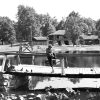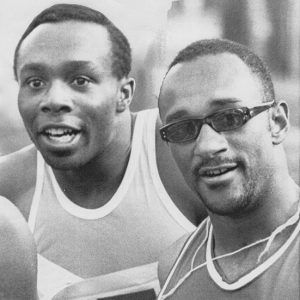calsfoundation@cals.org
Charles Edward Greene (1945–2022)
Charles Greene, born in Pine Bluff (Jefferson County), was a track and field champion who won the bronze medal in the 100-meter dash at the 1968 Olympic Games. He also took gold—and was part of a world-record performance—in the 4×100-meter relay in 1968.
Charles Edward (Charlie) Greene was born on March 21, 1945, in Pine Bluff. Six months after his birth, his mother, Bertha Johnson, moved them to Chicago, Illinois, to escape the segregation of Pine Bluff. In January 1946, they moved to Washington State, near the Grand Coulee Dam, where she took a job as a domestic worker. Later that year, the family moved to Seattle, where his mother worked as a barber and cleaned houses part-time.
Greene began running track in the fourth grade and entered competition at O’Dea High School, an all-boys Catholic school in Seattle. At O’Dea, he specialized in the 100- and 220-yard dashes. Greene won the state high school championship in the 100 in 1962, and the state titles in the 100 and 220 in 1963. He triumphed in the 100 at the Golden West Invitational in Sacramento, California, and ended his senior year as the number-one high school sprinter in the nation in 1963.
Greene accepted an athletic scholarship to the University of Nebraska, turning down offers from Arizona State University and San Jose State University. Since the National Collegiate Athletic Association (NCAA) rules did not permit freshmen to compete at that time, he raced in Amateur Athletic Union (AAU) and other national-level meets. In 1964, Greene took second in the 60-yard dash at the AAU indoor national championships and in the 100 meters at the AAU outdoor national championships. At the 1964 Olympic trials, he finished sixth in the 100-meter final, slowed by a hamstring injury in the last twenty meters. At this time, Greene began wearing prescription sunglasses during races, setting himself apart from other runners.
At the University of Nebraska, Greene became the nation’s leading collegiate sprinter. He captured three consecutive NCAA titles in the 60-yard dash indoors from 1965 to 1967, three consecutive NCAA titles in the 100-yard dash outdoors from 1965 to 1967, and the AAU title in the 100 in 1966. Greene won the 100 at the 1967 NCAA championship in the meet record time of 9.21, which remained the fastest electronic time for the 100 yards until Asafa Powell of Jamaica was timed in 9.09 during a 100-meter race in 2010.
At the 1968 AAU outdoor national championships, Greene participated in a historic night of 100-meter sprinting. First, fellow Arkansas native Jim Hines won the first qualifying heat in the wind-aided time of 9.8. Greene won the fourth heat with a time of 10.0, equaling the existing world record, followed by Roger Bambuck of France, who also posted 10.0. Hines won the first semi-final with a time of 9.9, setting a new world record for the distance, with Ronnie Ray Smith also clocking in at 9.9 to earn a share of the world record. Greene won the second semi-final with 9.9, to equal the new world record. Ultimately, Greene triumphed in the final to win his second national title in the 100 yards/meters in the wind-aided time of 10.0, capping off an evening historians have dubbed “The Night of Speed.”
The 1968 Olympic trials followed the AAU national championships, another meet in which Greene and Hines would compete. Paired in the second qualifying heat, Greene defeated Hines, 10.30 to 10.31, as both runners qualified for the next round of quarter-finals. Greene won his quarter-final and semi-final races, as did Hines, setting up a rematch of their AAU championship race. This time, however, Hines prevailed, with Greene in second place.
At the 1968 Olympic Games in Mexico City, Mexico, Greene had the opportunity to establish himself as the world’s premier sprinter. Despite winning his quarterfinal and semifinal races in 10.02, then the fastest electronic time for 100 meters, Greene pulled a hamstring in the final and finished third with a time 10.07 seconds. Hines won the final in 9.95, marking the first electronically timed 100 meters in less than ten seconds. Greene combined with Hines, Mel Pender, and Ronnie Ray Smith to win the 4×100-meter relay in the world-record time of 38.24 seconds. The 1968 Olympic Games concluded a rivalry between Greene and Hines dating back to 1966, in which Greene had defeated Hines in ten of fifteen meetings in 100 meters/yards.
Greene continued to compete in the 100 meters/yards through the 1972 Olympic trials. After finishing third in the 100-yard dash in 1969 and 1970 and fourth in 1971, he finished sixth in the quarter-finals of the 100 meters at the Olympic trials. During this time, however, Greene focused on other things, such as completing a graduate degree at the University of Nebraska in 1969 and earning commission as an officer in the U.S. Army upon completion of the university’s Reserve Officers’ Training Corps (ROTC) program that same year. He married a journalist (Linda) from Philadelphia, Pennsylvania, whom he had met at the Olympic Games; they had two daughters.
Greene retired from the army with the rank of major in 1989. While in the military, he served as the sprint coach at West Point and head coach of the All-Army team. Greene became a director for Special Olympics International in Washington DC, after which he returned to Lincoln, Nebraska, where he worked in student affairs at the University of Nebraska. He was inducted into the USA Track and Field Hall of Fame in 1992.
Despite declining health since 1988, which included a kidney transplant in 2010, Greene remained active in the University of Nebraska community in his later years. He died on March 14, 2022, in Lincoln, Nebraska.
For additional information:
Murrell, L. C. “Once the World’s Fastest,” Pine Bluff Commercial, July 14, 2012.
Raley, Dan. “Where Are They Now? Charlie Greene Took Skills and Ran with Them.” Seattle Post-Intelligencer, June 17, 2008. Online at http://www.seattlepi.com/sports/article/Where-Are-They-Now-Charlie-Greene-took-skills-1276861.php (accessed June 7, 2023).
York, Randy. “Greene Focuses on Rehab and Helping Youth as His World Record Falls.” Nebraska.com, June 18, 2010. http://www.huskers.com/ViewArticle.dbml?DB_OEM_ID=100&ATCLID=204961436 (accessed June 7, 2023).
———. “Once the World’s Fastest Man, Charlie Greene Gets Kidney Transplant.” Nebraska.com, February 10, 2010. http://www.huskers.com/ViewArticle.dbml?DB_OEM_ID=100&ATCLID=204882321 (accessed June 7, 2023).
Adam R. Hornbuckle
Spring Hill, Tennessee
 Divergent Prosperity and the Arc of Reform, 1968–2022
Divergent Prosperity and the Arc of Reform, 1968–2022 Olympians
Olympians Recreation and Sports
Recreation and Sports Jim Hines and Charles Greene
Jim Hines and Charles Greene 



As a young private in the U.S. Army I was shipped to Berlin, Germany, in 1973. I met briefly with Sergeant Greene, at which time he stated that they did not need anymore clerk typists in Berlin and I would be shipped back to Frankfurt until it was decided what base needed a clerk typist. I did not want to go, and I told Sergeant Greene there must be some job in Berlin I could do. He asked my history, and I told him I had done magic and comedy shows since I was thirteen. He sent me over to meet with a civilian person in charge of odd assignments ( I guess). I was then assigned to special services entertainment in Berlin. The next night I was doing a comedy magic show at the Tempelhof Airport for the annual Little League awards banquet. Four months later I was sent to Worms, Germany, assigned to the Tascom Showcase. For the next sixteen months, I traveled all over the world performing for my fellow troops. It was a gift and a blessing for my time of service in the army. I never got the opportunity to thank Sergeant Greene. It was a dream of a lifetime for me and all because he decided to think “outside the box.” Thank you, Sergeant Greene.